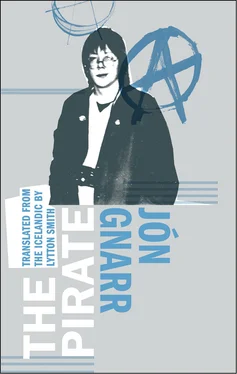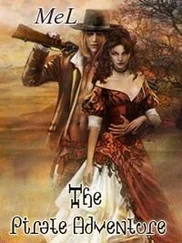Jón Gnarr - The Pirate
Здесь есть возможность читать онлайн «Jón Gnarr - The Pirate» весь текст электронной книги совершенно бесплатно (целиком полную версию без сокращений). В некоторых случаях можно слушать аудио, скачать через торрент в формате fb2 и присутствует краткое содержание. Год выпуска: 2016, Издательство: Deep Vellum Publishing, Жанр: Современная проза, Биографии и Мемуары, на английском языке. Описание произведения, (предисловие) а так же отзывы посетителей доступны на портале библиотеки ЛибКат.
- Название:The Pirate
- Автор:
- Издательство:Deep Vellum Publishing
- Жанр:
- Год:2016
- ISBN:нет данных
- Рейтинг книги:3 / 5. Голосов: 1
-
Избранное:Добавить в избранное
- Отзывы:
-
Ваша оценка:
- 60
- 1
- 2
- 3
- 4
- 5
The Pirate: краткое содержание, описание и аннотация
Предлагаем к чтению аннотацию, описание, краткое содержание или предисловие (зависит от того, что написал сам автор книги «The Pirate»). Если вы не нашли необходимую информацию о книге — напишите в комментариях, мы постараемся отыскать её.
." — "If there were more people like Jón Gnarr the world wouldn't be in such a mess." — The second book in a trilogy chronicling the troubled childhood of international sensation Jón Gnarr,
revisits his teenage years with sincere compassion and great humor: bullied relentlessly, Jón receives rebellious inner strength through the Sex Pistols and Prince Kropotkin — punk rock and anarchy offer the promise of a better and more exciting life.
Jón Gnarr
The Pirate — читать онлайн бесплатно полную книгу (весь текст) целиком
Ниже представлен текст книги, разбитый по страницам. Система сохранения места последней прочитанной страницы, позволяет с удобством читать онлайн бесплатно книгу «The Pirate», без необходимости каждый раз заново искать на чём Вы остановились. Поставьте закладку, и сможете в любой момент перейти на страницу, на которой закончили чтение.
Интервал:
Закладка:
I could afford just one album. I looked through all the punk albums in the shop carefully and listened to them. I took care not to buy an album I could borrow from Óli. Also, most of the records only had one good song on them. I listened to Sham 69. They were fairly popular. I wasn’t a big fan. The Dead Kennedys had a few good songs like “California Über Alles” and “Too Drunk to Fuck,” but I still didn’t think it was worth buying the whole album.
After careful consideration, I decided to buy Inflammable Material by Stiff Little Fingers. I’d seen a program about them on TV. They were from Northern Ireland and seemed to have fairly strong opinions on life and existence. That carried a lot of weight — plus the lyrics came with the album. But what determined that I bought this album rather than another one was that the lead singer was wearing glasses. He had square steel-frame glasses like I did, and I immediately felt a connection with him.
There weren’t many punks in Fossvogur. There were many who liked the music yet who weren’t willing to go all the way, like the girl in the convenience store in Akureyri. They wore normal clothes but owned albums by punk bands. Then there were the fake punks. They thought they could be punks by listening to the music, but they lacked the core mentality, i.e., they’d neither given up on the future, nor were they furious at the system. For these people, punk was just a superficial, entertaining fashion. They even listened to Adam Ant and considered him a punk. They usually had no interest in anarchism, and I didn’t want anything to do with them. You had to be careful of fake punks. For me, punk wasn’t a fad but a lifestyle. The clothes were a surefire way to be part of a definite group and to make it possible for other punks to recognize me. They were also a firm statement and expression of one’s state of mind and ideology. What mattered to me most was the deep meaning of what it was to be a punk. That meant being an outsider, incompatible with the masses, dreaming that one day I would be dead in peace, no longer needing to take part in any fucking shit. Anarchism was a strong part of it. To the normal world, I was a dangerous freak — ugly, stupid, silly. But in the world of punk rock, I was an equal — attractive, intelligent, exciting. Punk gave my life purpose. The rules no longer defined me. According to punk rock’s terms, I could do what I wanted. I could write without someone making fun of it when I wrote badly. It was punk to write badly. I could play the guitar without having learned it. I could say and do things the system rejected because punk rejected the system. Punk rebelled against the system and against systematic thought. The system I knew best was the school system. I hated it, and I feared all systems that might be trying to force me into a future. I hated everyone who lived by the rules. I hated the values that deemed desirable that which I didn’t know and held all my qualities worthless. The system wanted to peg me as an abnormal deviation. I didn’t belong in the school system. But I didn’t belong with the dunces, either. The system thought I was stupid, but I wasn’t. Perhaps I was simply too smart for the system. The Punk overcomes the system: I realized I didn’t have to learn all their damn rules. I didn’t believe half the crap. I saw no point in learning math or Danish. I didn’t care about other people’s opinions of me. I refused to keep letting others define me. Punk delivered me from all the invisible demands on which school, Mom, and Dad insisted. I wanted to express myself, talk and even scream. I wanted to tear myself free. I wanted peace. Punk was a ship setting off from a boring shore, and I jumped on board toward a new adventure.
I started going to the youth center at Bústaðir to try to find other punks. I ran into Alli there. He lived one street over. His father was a teacher at Austurbæjar School, and Alli went to school there, so we didn’t really see each other except during the summer. Alli had become a punk. He was wearing an old suit jacket with patches on it. I checked them carefully. They were all punk except one: The Police. The Police weren’t a punk band, but New Wave. Their lyrics were asinine and not about anything important. One song was called “Walking on the Moon” and was about some idiotic people who were walking about on the moon. There were endless songs about girls like Roxanne. Real punks didn’t whine about girls. Still, Alli was enough of a punk to kick around with.
Most kids at Bústaðir were either disco freaks or normals. Most were fine and left me alone. But there was a certain group of boys I called the Morons. The Morons were boys who thought they were really funny and witty and were always playing pranks and fronting around each other. But they were annoying, hanging out in groups and talking loudly. The Morons were always cheerful but also really annoying. In winter they would wrestle in the snow and try to cram snow inside each other’s mouths and stuff. Their favorite music was comedy ska, like Madness and Bad Manners. They went to films like H.O.T.S. about cheerleaders in high school and thought they were brilliant. They didn’t have girlfriends; they just hung around with each other. Their lives seemed to pass in scuffles, screeches, and bad jokes.
When the Morons were preparing a prank, their behavior changed. They’d start whispering and giggling and tense up with the exertion of stifling their laughter. Their pranks always ended up being somehow related to girls. Sometimes they played with a tampon or pad, dipping it in ketchup and throwing it at each other and screaming with hilarity. Condoms, however, were a total fascination to them. Sometimes they showed up with a condom they had spat in and threw it amongst themselves, or pretended to discover it on each other. When they were done throwing it around themselves, they threw it at me. The Morons had a particular interest in me.
Every single night, the Morons taunted me. They jeered at me, pushed me, and tried to trip me when they ran into me. I asked them to leave me alone but that just got them more keyed up, so I learned to keep quiet until they were done. Usually, some girl came to my rescue, or an employee. I endured it without ever complaining to the staff. I knew that if I did, I would simply get beaten up later. Before I left, I made sure that they weren’t outside. Inside, I tried to sit where employees could see me, and I never went to the bathroom alone. When I needed to go, I seized my chance as soon as some employee did, or snuck away when my enemies weren’t around or weren’t looking.
I was never invited to join in with any of the stuff that was going on. I didn’t want to, either; I simply wasn’t interested. Generally, I thought teenagers were boring and stupid. Most of them were caught up in pointless and superficial stuff. The girls seemed most concerned about their looks. The boys thought about nothing but the girls. If they had hobbies, it was sports. I despised sports.
I hung out in the corner, watching and waiting for a punk to walk in the door. The one I most hoped to meet was Siggi the Punk. He was the most famous punk in Reykjavík. He was in the band Masturbation and was from the neighborhood. He was a real punk, with earrings and a leather jacket and marked-up jeans. I’d never met him. I’d only seen pictures of him in the papers. I’d heard stories about him and seen graffiti by him on bus stops. He drew anarchist signs in black ink and wrote short slogans like “Fuck The System” and “Down with the police!” I really wanted to meet Siggi the Punk, get information and advice from him, and even become his friend. But he was a few years older than me, so it was pretty unlikely that he had any interest in befriending me.
I wanted to meet someone with whom I could talk, someone who understood me. Someone in the same boat. I wanted to talk about the system and how it was trying to kill my spirit. I wanted to meet someone with an understanding of anarchy who could tell me more about that phenomenon. I wanted to explore the mysteries of life. I wouldn’t be at ease until I could get some answers. Maybe there was some anarchist country somewhere where people could go and be left alone. I craved knowledge the way a thirsty man longs for water. But not those pointless facts taught in school. I had no interest in them. I wanted my knowledge. There were no answers in the newspapers, either. They all seemed busy with anything but what mattered. I wanted to find books that might possibly contain some answers for me. But what books were there? There weren’t any in the library. They were old and outdated, dry and boring. Þórbergur Þórðarson was dead. If he’d been alive, I would have tracked him down. I’d read most of his books. I felt in harmony with him. He had understood me and guided me. Why was I always so nervous, anxious, and uneasy in my soul while everyone else seemed relaxed and worry-free? Was I abnormal? Was I insane? Or was it perhaps that they were abnormal?
Читать дальшеИнтервал:
Закладка:
Похожие книги на «The Pirate»
Представляем Вашему вниманию похожие книги на «The Pirate» списком для выбора. Мы отобрали схожую по названию и смыслу литературу в надежде предоставить читателям больше вариантов отыскать новые, интересные, ещё непрочитанные произведения.
Обсуждение, отзывы о книге «The Pirate» и просто собственные мнения читателей. Оставьте ваши комментарии, напишите, что Вы думаете о произведении, его смысле или главных героях. Укажите что конкретно понравилось, а что нет, и почему Вы так считаете.











